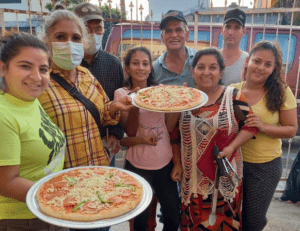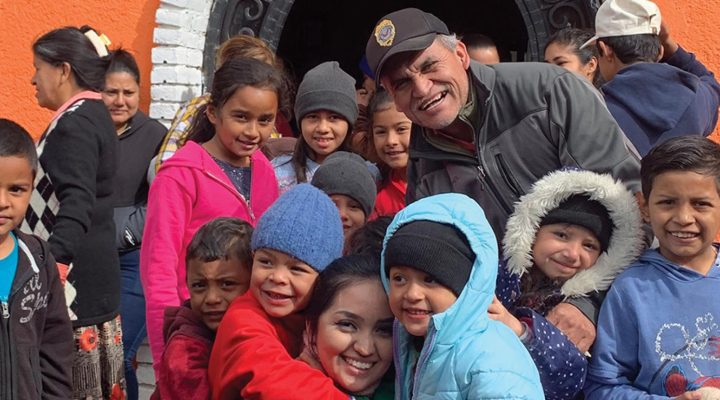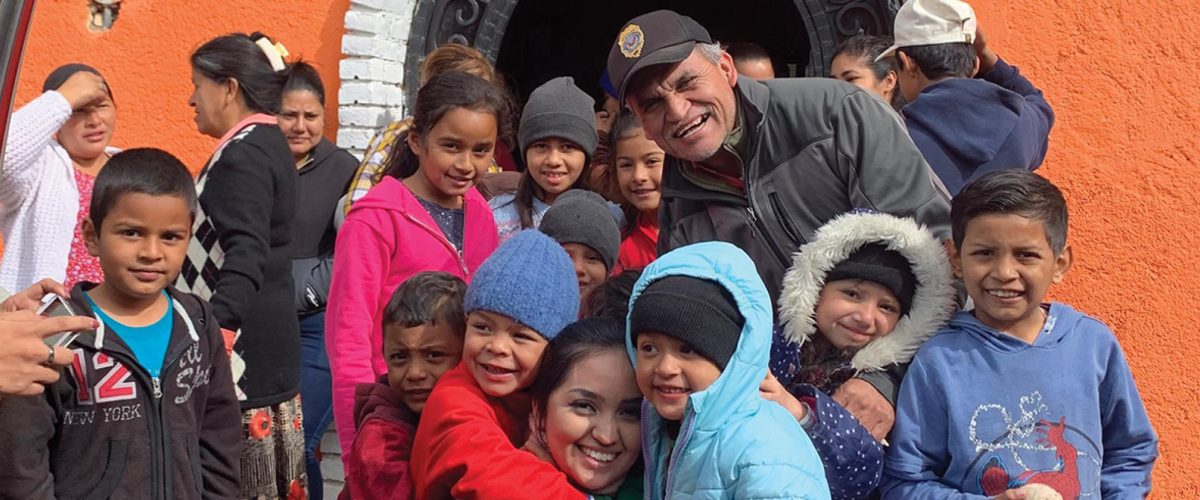A Mexican cartel got more than it bargained for earlier this month by kidnapping Lorenzo Ortiz, an American pastor who operates shelters for asylum seekers and other migrants south of the U.S.-Mexico border.
His abduction at 6 p.m. June 2 in Nuevo Laredo, one of the most dangerous cities in terms of cartel activities, jolted his family, fellow pastors and the leaders of ministry partners such as Fellowship Southwest.
But it was the kidnappers who were in for a shock when they learned Ortiz does not charge migrants to stay in his four shelters in Nuevo Laredo and one in Saltillo, Mexico, the pastor explained in a video recorded and posted recently by Fellowship Southwest and moderated by Communications Director Cameron Vickery.
“I said, ‘We do this for free,’ and they told me all kinds of bad words and scary things,” he said. “At 2 a.m. (June 3) they took me to their boss who said, ‘I can’t believe you have this amount of people and you are not charging anyone. No one does that for free. I am going to have you beaten.”
“I can’t believe you have this amount of people and you are not charging anyone. No one does that for free. I am going to have you beaten.”
Ortiz invited his assailants to use the contacts in his cell phone to confirm that his shelter network operates free of charge, and therefore posed no financial competition to the cartel. “I said, ‘Call them all and if you find any migrant who said I extort them, you can pull the trigger.’”
Ortiz’s challenge wasn’t mere bravado. He had received advance warning about his abduction from one of his 15 shelter residents then being held by the same cartel, yet he still ventured to Nuevo Laredo from his home in nearby Laredo, Texas. He did so knowing other pastors have been executed by the cartels.

Pastor Lorenzo Ortiz, center, and residents of one of his shelters in Nuevo Laredo, Mexico. (Photo/Courtesy of Lorenzo Ortiz)
“We have a lot of families and I have four shelters and I never run from any cartel or from anybody,” he explained. “I know that God is in control. He said his angel is going to be with us. He is going to protect us. He is going to defend us. So, I do believe that.”
Ortiz also believed he would be freed after two or three hours because he and his ministry are well known to most Mexican cartels. But this group’s leader, who was new to the area, had other ideas and sent photos of the captive and a $40,000 ransom demand to Ortiz’s family.
That move didn’t have the desired effect, though, as family calls to U.S. and Mexican authorities sparked an all-out military and law enforcement search for Ortiz the day after his abduction. As a result, the beating threats ceased and the ransom demand was reduced to $20,000 — which Ortiz raised — before being dropped altogether.
“Now they feel for the first time that they were going to die because there was a helicopter all around the city with (Mexican) soldiers and marines, and those guys thought the soldiers were going to shoot them,” Ortiz said. “When the boss saw all what was happening, he knew I was not just a regular pastor.”
When Ortiz was released around 11 p.m. June 3, the cartel member tasked with freeing him offered to fix two flat tires on the pastor’s van.
When Ortiz was released around 11 p.m. June 3, the cartel member tasked with freeing him offered to fix two flat tires on the pastor’s van. The vehicle was returned the next day with new tires, and the other 15 kidnapping victims also were released.
Ortiz said it has been business as usual ever since the incident. “I do not believe we are supposed to run away and not do our jobs.”
What the cartel learned about Ortiz that weekend was well-known fact in the U.S. and Mexico, said Elket Rodriguez, Cooperative Baptist Fellowship field personnel serving at the U.S.-Mexico border in collaboration with Fellowship Southwest.
Besides his shelter operation for migrants in Mexico, Ortiz also works closely with respite centers in Texas where legal asylum seekers are connected with sponsors across the U.S. He routinely works with Fellowship Southwest and other faith-based partners and with U.S. Customs and Border Protection, the Department of Homeland Security, the FBI and with their counterparts in Mexico.
Much of Ortiz’ ministry includes helping migrants affected by Title 42, which enables the U.S. government to rapidly expel asylum seekers and other migrants to Mexico where they face extortion and death at the hands of cartels.
“They are very well organized, and they have a lot of control,” he said of the organized crime groups. “This is all a business for the cartels. They see humans as commodities. So if you want to get across the U.S. and get back, you have to pay a fee because they own the turf.”
The crime groups are especially suspicious of migrants who enter the U.S. at one port of entry and are returned through another by Title 42, Rodriguez said. “If there is any way they think you are related to a rival cartel, you are going to pay the price. And Customs and Border Patrol and the Department of Homeland Security, they know this. Still, they continually, each day, expel people to their deaths.”
“Customs and Border Patrol and the Department of Homeland Security, they know this. Still, they continually, each day, expel people to their deaths.”
Ministers and others who try to assist migrants in navigating those challenges also are viewed with suspicion by the cartels, Rodriguez said. “But Pastor Lorenzo and the other border pastors are not asking for any money for sheltering migrants, for transporting migrants, for protecting migrants and helping them logistically from a humanitarian perspective. That means, for the cartels, you are doing this in good faith from your own convictions and that you are not doing it to cut into our business.”
That is still a dangerous form of ministry, he said. “People like Lorenzo every day are putting their lives at risk, and all of the border pastors we help at Fellowship Southwest and the Cooperative Baptist Fellowship, they are putting their lives out there and they are being exposed to a lot of dangers, especially with cartels precisely because of this policy, Title 42.”
Ortiz said faith has to take priority over fear. “If we want to make sure our light shines in the darker places, we are not supposed to be scared or run away. We have to step forward.”
Related articles:
Ortiz guided by equal parts courage and faith in border ministry
Title 42 is expelling the good people, not the bad people, border advocate explains
7 reasons to calm down about the termination of Title 42 | Opinion by Elket Rodriguez
Immigration advocates praise rumored end to Title 42 but say the end should come today
End of Title 42 is popular with immigration advocates but not so much with voters


